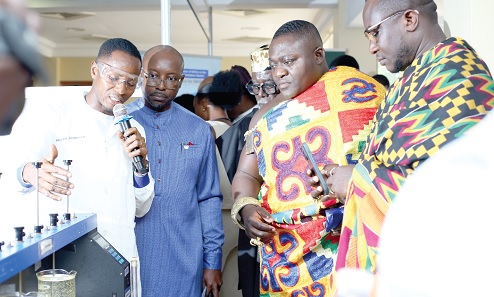How severely water resources are being overused relative to their availability, otherwise known as the water stress level, has dropped from 1,900 cubic metres (1.9 million litres) per head to 1,500 cubic metres (1.5 million litres) per head.
This, according to the Water Resources Commission, means that every citizen has lost about 400 cubic metres (400,000 litres) of water between 2016 and now.
The Head of Policy, Planning, Research, Monitoring and Evaluation (PPRME) at the WRC, Dr Mawuli Lumor, who made this known to the Daily Graphic, described the level of devastation going on in the water bodies as alarming.
He said urgent measures were needed to immediately halt the pollution of rivers caused by illegal miners to prevent an imminent crisis.
"Collectively, the losses of water we are recording are huge, and the future is bleak because the population continue to increase while we are losing our water to degradation by illegal mining and other activities.
"If we do not take action now, we will drop below 1,000 cubic metres per head in the next 10 years, and get to the situation where the government will come in to regulate the amount of litres of water one can take in a day," the expert added.
Dr Lumor was speaking during an event to commemorate World Rivers Day (WRD) in Accra yesterday on the theme: "Our rivers, our future."
The day is set aside by the UN to highlight the values of rivers, increase public awareness, and encourage improved stewardship of rivers around the world.
The day has been celebrated since 2005, when the UN launched the Water for Life Decade to help create greater awareness of the need to better care for water resources.
Ghana is joining the rest of the world to celebrate the day for the first time.
Collective fight
The Chairperson of the Coalition of NGOs in Water and Sanitation (CONIWAS), Dr Beata Awinpoka Akanyani, said it was worrying that although rivers were lifelines — nourishing farms, powering homes, supplying communities with water, and supporting biodiversity, they remained under serious threat from pollution, poor land use practices and illegal mining.
"We must confront the ongoing threat of illegal galamsey.
This harmful practice continues to degrade freshwater ecosystems, poison rivers with mercury and heavy metals, and compromise the health and livelihoods," she said.
Dr Akanuani also called for strict enforcement, community-based monitoring, and sustainable alternatives to protect the country's rivers, adding, "the health of our water bodies is the health of our people and of our future".
Interventions
The Chief of Atwima Kwanwoma, who is also a member of the WRC Board, Nana Amponsah Kwaa IV, said the shutdown of some water treatment plants by the Ghana Water Company Limited because of excessive pollution of rivers bore ample testimony to prompt action needed in dealing with the galamsey menace.
Nana Kwaa IV, however, commended the government for the measures put in place to fight the illegal mining scourge, particularly the setting up of the National Anti-Illegal Mining Operations Secretariat (NAIMOS), and other intelligence-led operation programmes.
“Despite these initiatives, we must all know that the government alone can never save our rivers.
The responsibility is a shared one, and we must all get involved,” he said.

